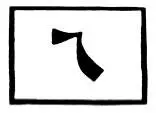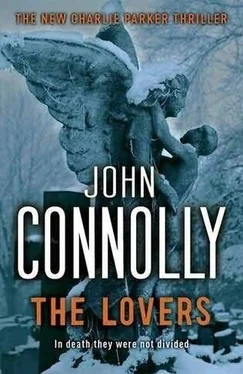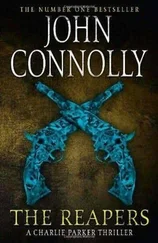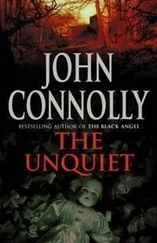John Connolly - The Lovers
Здесь есть возможность читать онлайн «John Connolly - The Lovers» весь текст электронной книги совершенно бесплатно (целиком полную версию без сокращений). В некоторых случаях можно слушать аудио, скачать через торрент в формате fb2 и присутствует краткое содержание. Жанр: Триллер, на английском языке. Описание произведения, (предисловие) а так же отзывы посетителей доступны на портале библиотеки ЛибКат.
- Название:The Lovers
- Автор:
- Жанр:
- Год:неизвестен
- ISBN:нет данных
- Рейтинг книги:4 / 5. Голосов: 1
-
Избранное:Добавить в избранное
- Отзывы:
-
Ваша оценка:
- 80
- 1
- 2
- 3
- 4
- 5
The Lovers: краткое содержание, описание и аннотация
Предлагаем к чтению аннотацию, описание, краткое содержание или предисловие (зависит от того, что написал сам автор книги «The Lovers»). Если вы не нашли необходимую информацию о книге — напишите в комментариях, мы постараемся отыскать её.
The Lovers — читать онлайн бесплатно полную книгу (весь текст) целиком
Ниже представлен текст книги, разбитый по страницам. Система сохранения места последней прочитанной страницы, позволяет с удобством читать онлайн бесплатно книгу «The Lovers», без необходимости каждый раз заново искать на чём Вы остановились. Поставьте закладку, и сможете в любой момент перейти на страницу, на которой закончили чтение.
Интервал:
Закладка:
He was also becoming increasingly aware of the fact that he knew almost nothing about Caroline Carr. She had sketched only the barest details of her life for him: an upbringing in Modesto, California; the death of her mother in a fire; and her growing awareness of the two figures that were now pursuing her. Caroline had managed to stay ahead of them for so long, but she had grown careless, and become tired of running. She had almost begun to welcome the thought that they might find her, until that night when they tried to break into her apartment and her fear of them overcame any misplaced desire she might have held to end the chase. She could not tell Will why they had targeted her, for she said that she did not know. She knew only that they were a threat to her, and they wanted to end her life. When he asked her why she had not gone to the police, she had laughed at him, and the scorn in her voice had hurt him.
“You think I didn’t? I went to them after my mother died. I told them that the fire had been started deliberately, but they were looking at a disturbed, grief-stricken girl, and they didn’t listen to a word I said. After that, I decided that the only thing for it was to look after myself. What else could I do? Tell people I was being hunted for no reason by a man and woman that nobody had ever seen except me? They’d have locked me up, and then I would have been trapped. I kept everything to myself until I met you. I thought that you were different.”
And Will had held her and told her that he was different, even as he wondered if he was being drawn into a frightened young woman’s elaborate fantasy. But then he recalled the man with the gun, and the pale woman with the dead eyes, and he knew that there was some truth in all that Caroline Carr had told him.
He had begun to make informal inquiries about the tattoo on the late Peter Ackerman’s arm, and eventually he was referred to a young rabbi by the name of Epstein out in Brooklyn Heights. Over a glass of sweet kosher wine, the rabbi had talked to him of angels, of obscure books that, as far as Will could tell, had been left out of the Bible because they were even stranger than most of the stuff that had been left in, and that was saying something. As they spoke, Will began to realize that the rabbi was interrogating him as much as he was interrogating the rabbi.
“So this is a sect, a cult of some kind, that Peter Ackerman became involved with?” said Will.
“Perhaps,” said the rabbi. Then: “Why does this man interest you so much?”
“I’m a cop. I was there when he died.”
“No, there’s more to this.” The rabbi sat back in his chair and tugged on his short beard. His eyes never left Will’s face. Eventually, he seemed to reach a decision. “May I call you Will?”
Will nodded his assent.
“I am going to tell you something now, Will. If I have guessed right, then I would appreciate it if you would confirm that it is so.”
Will felt that he had no choice but to agree. As he told Jimmy later, he had somehow become involved in an exchange of information.
“This man was not alone,” said Epstein. “There was a woman with him. She was probably close to his own age. Is that correct?”
Will thought about lying, but only for a second. “How did you know that?”
Epstein produced a copy of the symbol that had been found on Peter Ackerman’s body.

“Because of this. They always hunt in pairs. After all, they are lovers. The male”-he pointed to the Ackerman symbol before slipping another sheet of paper from behind it-“and the female.”

Will examined them both.
“So this woman is part of the same cult?”
“No, Will. I don’t believe that this is a cult at all. This is something much worse…”
Jimmy pressed his fingertips to his head. He was thinking hard. I left him to it. Epstein: I had met the rabbi on a number of occasions, and had helped him to track down his son’s killers, and in all that time he had never told me that he had known my father.
“Their names,” Jimmy said. “I can’t remember their names.”
“What names?”
“The names the rabbi told Will. The man and the woman, they each had names. Like I told you, the man’s was ‘An-’ something, but I can’t remember the woman’s. It’s like they’ve been cut from my memory.”
He was becoming frustrated, and distracted.
“It doesn’t matter for now,” I said. “We can come back to it later.”
“They all had names,” said Jimmy. He sounded confused.
“What?”
“It was something else the rabbi told Will. He said that they all had names.” He looked at me with something like despair. “What does that mean?”
And I remembered my own grandfather in Maine uttering those same words as Alzheimer’s began snuffing out his memories like candle flames caught between fingers. “They all have names, Charlie,” he had said, his face bright with a terrible urgency. “They all have names .” I didn’t know what he meant, not then. It was only later, when faced by creatures like Kittim and Brightwell, that I began to learn.
“It means that even the worst of things can be named,” I told Jimmy. “And it’s important to know those names.”
Because with naming came an understanding of the thing.
And with understanding came the possibility of its destruction.
The need to protect Caroline Carr put huge additional pressure on them both, at a time when the city was in turmoil, and the demands upon them as police officers were seemingly unceasing. In January 1966, the transit workers had gone out on strike, all thirty-four thousand of them, crippling the transport network and wreaking havoc with the city’s economy. Eventually, Mayor Lindsay, who had succeeded Wagner in January ’66, had buckled, what with the public complaining and Michael Quill, the union leader, taunting him from behind bars as a “pipsqueak” and “a boy in short trousers.” By giving in to the transit workers, though, Lindsay-who was a good mayor in so many ways, let no one say otherwise-had opened the floodgates to an ongoing series of municipal strikes that would blight his administration. The antidraft movement was starting to simmer, a pot that had been threatening to come to a boil ever since four hundred activists had picketed the Whitehall Street induction center, a couple of them even burning their draft cards. It was still open season on dissenters, though, because most of the country was behind LBJ, even though U.S. troop strength had escalated that year from 180,000 to 385,000, U.S. casualties had tripled, and 5,000 U.S. soldiers would be dead by the end of that year alone. It would be another year before public opinion truly began to turn, but for now activists were more concerned with civil rights than Vietnam, even as some were gradually beginning to realize that one fed into the other, that the draft was unfair because most of those being called up by white draft boards were young black men who couldn’t use college as an excuse to defer since they had no chance of going to college in the first place. There were so-called new bohemians in the East Village, and marijuana and LSD were becoming the drugs of choice.
And Will Parker and Jimmy Gallagher, both young men themselves, and not unintelligent, put on their uniforms each day and wondered when they would be asked to break the heads of kids their own age, kids with whom, at least in Will’s case, they were largely in agreement. Everything was changing. They could smell it in the air.
Читать дальшеИнтервал:
Закладка:
Похожие книги на «The Lovers»
Представляем Вашему вниманию похожие книги на «The Lovers» списком для выбора. Мы отобрали схожую по названию и смыслу литературу в надежде предоставить читателям больше вариантов отыскать новые, интересные, ещё непрочитанные произведения.
Обсуждение, отзывы о книге «The Lovers» и просто собственные мнения читателей. Оставьте ваши комментарии, напишите, что Вы думаете о произведении, его смысле или главных героях. Укажите что конкретно понравилось, а что нет, и почему Вы так считаете.












